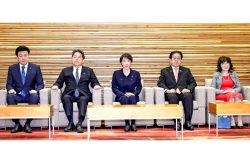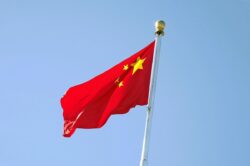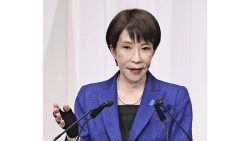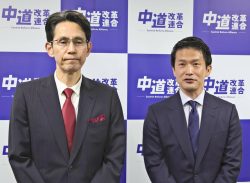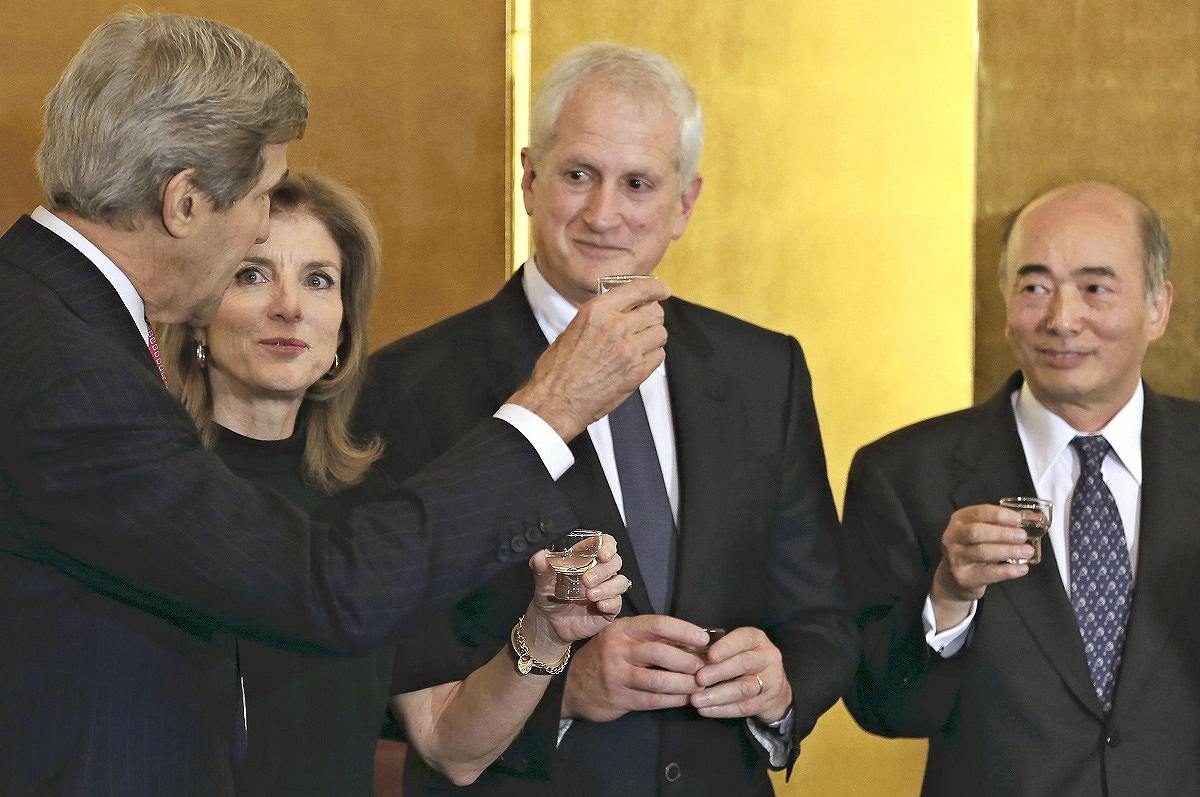
Kenichiro Sasae, right, shares a toast with then U.S. Secretary of State John Kerry, left, during a reception at the Japanese ambassador’s residence in Washington is November 2013. Also seen are then U.S. Ambassador to Japan Caroline Kennedy, center left, and her husband Edwin Schlossberg.
19:36 JST, December 2, 2020
Former U.S. Vice President Joe Biden is set to be sworn in as president in January. What approach will Biden’s administration take to international relations and Japan?
The Yomiuri Shimbun asked Kenichiro Sasae, a former Japanese ambassador to the United States, for his thoughts on the incoming U.S. administration. The following is excerpted from the interview.
Even after U.S. President Donald Trump leaves the White House, Trumpism — the political ideology and movement associated with Trump — will not quickly disappear from the United States.
The incoming Biden administration will have to spend a considerable amount of energy on dealing with pressing domestic issues.
I think Biden might even adopt protectionist policies on issues such as protecting U.S. workers and purchasing U.S.-made goods.
However, I think the United States will also return to a more multilateralist approach.
The United States will return to the World Health Organization and other international institutions that the Trump administration withdrew from, and Biden will be committed to tackling climate change.
The United States that we knew from before will return to a large extent.
Biden places great stock in international alliances.
Although Biden’s style differs from Trump’s, the recognition that Japan is the United States’ most important ally will not change.
Japan must not take this for granted; we need to actively fulfill our role in the alliance.
Prime Minister Yoshihide Suga is a can-doer. I am sure Suga can build a relationship of mutual trust with Biden.
The Yomiuri Shimbun: Rifts in U.S. society widened under the Trump administration.
Kenichiro Sasae: The United States comprises a range of diverse groups in every sense of the word, including politics, race, culture and region. The arrival of the Trump administration did not suddenly create tensions over this diversity; they already existed. The important thing is that the United States moves forward and overcomes these divisions, prejudice and discrimination. That is what makes the United States so amazing.
Q: What issues will the incoming Biden administration face?
A: Biden has said he will be a president for the United States, not just for the Democratic Party, and he has sought to mend divisions in U.S. society. His message hits the mark, but it is unclear whether rifts that formed over many years can be repaired at one stroke.
For the time being, Biden will need to spend a lot of time and effort dealing with three major problems — the new coronavirus pandemic, reviving the economy and racial issues. The mainstream element of the Republican Party will try to retain considerable clout, and it could try to hinder Biden, including on policies intended to bring the coronavirus under control. Biden also must stay onside with the Democratic Party’s increasingly powerful left wing.
Q: Biden has emphasized the importance of international alliances.
A: U.S.-Europe ties were strained during the Trump administration, so I think the desire to patch up those ties will be strong. Although Biden has said the United States is making a comeback, this will only be to the extent that this matches with U.S. interests. Returning to a more collaborative approach does not necessarily mean listening to everything the other side says.
Q: Many observers believe U.S.-China friction will continue.
A: China will remain an extremely important strategic challenge for the United States. This is the case for every political party. It would not be sensible to stumble into an inextricable standoff with China that has shades of the Cold War. By the same token, a deterrent should be maintained against China and steps taken to ensure Beijing does not misunderstand the U.S. posture.
China has been expanding its maritime footprint, including in the South China Sea and waters around the Senkaku Islands in Okinawa Prefecture. This issue closely affects Japan. During their telephone talks held Nov. 12, Suga and Biden agreed that Article 5 of the Japan-U.S. Security Treaty (see below) — which stipulates the U.S. obligation to defend Japan — would apply to the Senkaku Islands, and that both nations would work together to realize a “free and open Indo-Pacific” region. The hard part will be specifying what closer cooperation would entail, so it does not end up as an empty slogan.
Q: What should Japan’s role be?
A: Japan can offer its advice and opinion to the United States on matters pertaining to China relations. Japan does not need to say it will “mediate,” but it could offer China suggestions. In fact, I think it should.
The view that Japan prefers the Republican Party is incorrect. Japan’s position is that it can cooperate with any party, whether it be the Democrats or the Republicans. That will best serve Japan’s interests.
(Interview conducted by Yomiuri Shimbun Staff Writer Seima Oki)
Japan-U.S. Security Treaty’s Article 5
This article, which spells out the U.S. obligation to defend Japan, stipulates that each nation recognizes that an “armed attack against either party in the territories under the administration of Japan would be dangerous to its own peace and safety and declares that it would act to meet the common danger.” In 2014, Barack Obama became the first U.S. president to publicly state the Senkaku Islands in Okinawa Prefecture were covered by Article 5. President Donald Trump confirmed this position during a Japan-U.S. summit meeting in February 2017.
Kenichiro Sasae
Sasae held Foreign Ministry posts including director general of the Asian and Oceania Affairs Bureau and vice minister. He was ambassador to the United States from 2012 to 2018, when he represented Japan during the administrations of President Barack Obama and President Donald Trump. Sasae has been president of the Japan Institute of International Affairs since June 2018. He is 69.
Top Articles in Politics
-

LDP Wins Historic Landslide Victory
-

LDP Wins Landslide Victory, Secures Single-party Majority; Ruling Coalition with JIP Poised to Secure Over 300 seats (UPDATE 1)
-

Japan Tourism Agency Calls for Strengthening Measures Against Overtourism
-

CRA Leadership Election Will Center on Party Rebuilding; Lower House Defeat Leaves Divisions among Former CDPJ, Komeito Members
-

Voters Using AI to Choose Candidates in Japan’s Upcoming General Election; ChatGPT, Other AI Services Found Providing Incorrect Information
JN ACCESS RANKING
-

Japan Institute to Use Domestic Commercial Optical Lattice Clock to Set Japan Standard Time
-

Israeli Ambassador to Japan Speaks about Japan’s Role in the Reconstruction of Gaza
-

Man Infected with Measles May Have Come in Contact with Many People in Tokyo, Went to Store, Restaurant Around When Symptoms Emerged
-

China Eyes Rare Earth Foothold in Malaysia to Maintain Dominance, Counter Japan, U.S.
-

Prudential Life Insurance Plans to Fully Compensate for Damages Caused by Fraudulent Actions Without Waiting for Third-Party Committee Review


